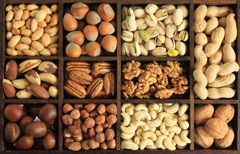Eating nuts linked to healthier, longer life

Move over, apples: A handful of nuts a day keeps the doctor away—and might help you live longer, according to new results from two long-running Harvard studies.
“We found that people who ate nuts every day lived longer, healthier lives than people who didn’t eat nuts,” said study co-author Dr. Frank Hu, professor of nutrition and epidemiology at the Harvard School of Public Health. The report, in tomorrow’s New England Journal of Medicine, showed that daily nut-eaters were less likely to die of cancer, heart disease, and respiratory disease. Overall, the daily nut-eaters were 20% less likely to have died during the course of the study than those who avoided nuts. (Peanuts, which are actually legumes, counted as nuts in this study).
The findings were gleaned from nearly 120,000 participants in the Nurses’ Health Study and the Physician’s Health Study. All answered questions about their diets at the beginning of the studies in the 1980s and then every two to four years during 30 years of follow-up. The researchers classified the participants into six categories that ranged from never eating nuts to eating them seven or more times per week. The more often people ate nuts, the lower their risk of premature death.
The findings echo those of earlier studies, according to Dr. Penny Kris-Etherton, professor of medicine at the University of Pennsylvania, who highlighted nut research at this week’s American Heart Association meeting in Dallas, Texas. “Eating nuts lowers LDL (“bad” cholesterol), raises HDL (“good” cholesterol) and also lowers blood pressure and blood pressure responses to stress,” said Dr. Kris-Etherton. Her research also shows that nut consumption helps boost a process called reverse cholesterol transport, by which HDL particles in the blood sweep away fatty plaque from clogged arteries. The Harvard researchers pointed out that the composition of nuts—fiber, healthy fats, vitamins, minerals, and phytochemicals—may provide “cardioprotective, anticarcinogenic, antiinflammatory, and antioxidant properties.”
Worried that eating nuts might make you fat, since they’re high in fat? In fact, frequent nut eaters were less likely to gain weigh in this and other studies. “Nuts are high in protein and fiber, which delays absorption and decreases hunger,” said Dr. Hu, adding that nuts contain mostly unsaturated healthy fats.
No “perfect” nut
Are certain nuts better than others? “Everybody is searching for the perfect nut,” says Dr. Kris-Etherton. But the health benefits hold true for a variety of nuts, including walnuts, almonds, peanuts, and pistachios, so eat your favorite. Or, as Kris-Etherton recommends, try mixed nuts—and be sure to choose unsalted over salted. She offered the following tips for making nuts part of your regular diet:
- spread nut butter on your morning toast instead of butter or cream cheese
- sprinkle chopped nuts on cereal or yogurt
- toss nuts into a salad or stir-fry
- top fruit or crackers with nut butter
- try nut-encrusted fish or chicken, such as pecan-encrusted trout
About the Author

Julie Corliss, Executive Editor, Harvard Heart Letter
Disclaimer:
As a service to our readers, Harvard Health Publishing provides access to our library of archived content. Please note the date of last review or update on all articles.
No content on this site, regardless of date, should ever be used as a substitute for direct medical advice from your doctor or other qualified clinician.















